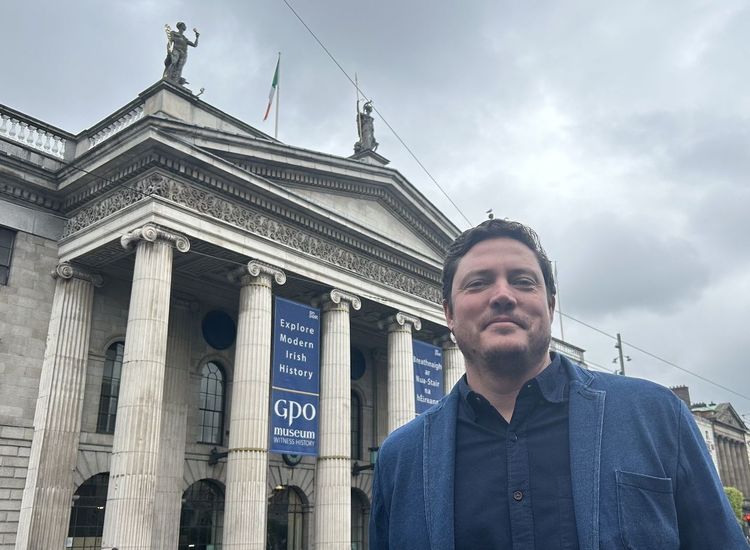Terry Moylan's book includes lyrics, melodies, liner notes, and commentary from Frank Harte’s nine albums.
Traditional Music / By Daniel Neely
Last week the U.S. Citizenship and Immigration Services, Department of Homeland Security, announced an Oct. 2 fee increase to a number of immigrant visas that will be detrimental not only to traditional Irish music, but also to independent musicians of all sorts.
Arguing that it had “conducted a comprehensive biennial fee review and determined that current fees do not recover the full cost of providing adjudication and naturalization services,” the Department of Homeland Security’s decided on “a weighted average increase of 20 percent, adding new fees for certain immigration benefit requests, establishing multiple fees for nonimmigrant worker petitions, and limiting the number of beneficiaries for certain forms.” In addition, DHS will separate Form I-129 “Petition for a Nonimmigrant Worker” into several forms with different corresponding fees.
Among the affected visa types that directly impact traditional artists coming to the United States to perform are the P- (for groups and "culturally unique" artists) and O- ("Individuals with Extraordinary Ability or Achievement”) varieties. The fee increase to the former will be 51 percent, from $460 to $695, while latter will increase 53 percent, from $460 to $705.
In 2017, Milwaukee Irish Fest published a detailed analysis outlining the costly, arduous process foreign artists must endure to obtain a work visa (see tinyurl.com/DisincentivesForTouringArtists). These new measures only make this process more difficult. They not only put undue burden on independent musicians, but on music camps, festivals, and fleadhanna, all but ensuring a decreased flow of music from Ireland when things open back up after COVID-19. Hopefully, this policy will change in the future.
Speaking of which, for many years one of Ireland’s most loved visitors to the United States was Dublin singer Frank Harte. One of the greatest singers and song collectors of all time, Harte was a prolific recording artist (his recordings generally featured the accompaniment of the great Dónal Lunny) and over the years he amassed an extensive and substantial archive of songs. This made him a source for some of Irish music’s superstars, including people like Christy Moore, Andy Irvine, Mick Moloney, Mary Black, Karan Casey, and Cathy Jordan, among many, many more.
In the U.S., he was known as a member of Green Fields of America, and a regular instructor at the Augusta Irish Week, as well as other Irish music festivals. He was a figure who touched all who met him and an independent artist who, because of a visa process that some performers have in the past described as “humiliating” (and now only moreso), perhaps would have eschewed US trips in the current climate.
Harte’s work is the focus of a truly important new book “A Living Voice: The Frank Harte Song Collection.” Edited by Terry Moylan, the book includes lyrics, melodies, liner notes, and commentary from Harte’s nine albums, selections from his book “Songs of Dublin,” a section of additional songs he sang from various recorded and archival sources, and a final section of song tributes. In all, the collection includes 198 entries, each gorgeously presented and finely laid out in a way that does Harte’s legacy justice.
Because the collection makes the contents of Harte’s albums its primary stock, Harte’s personality is evident on every page. Bear in mind, this book does not contain the entirely of what Moylan calls Harte’s “song-store.” Harte was an extraordinarily prolific collector and not only do the songs he chose to record reflect his interests and character, the specific versions do as well. This should delight those who knew or were fans of Harte and those who are interested in his approach to song collection.
Moylan deserves special commendation for the utterly brilliant job of arranging the material. The book itself is clear in presentation and intuitive to use. Moylan’s preface is very well done and clearly articulates the editorial choices he made along the way. Moylan, together with Jerry O’Reilly, wrote an excellent “notes” section that complements Harte’s own commentary on each song and adds fascinating supplemental information and documentation.
Again, this is an incredible and historic volume that singers should consider an essential purchase. In scope and brilliance, I’m reminded of collections like Sam Henry's “Songs of the People” and Jimmy Crowley's “Songs from the Beautiful City: The Cork Urban Ballads,” as each is well curated and reflects time, place, and history in noteworthy ways. Because the material here not only maps onto Harte’s recorded output so faithfully but expands upon it, this volume is an especially important companion for those who experience Harte’s music the modern way, via digital players and streaming services that divorce recorded sound from the written information that enhances it and helps give it meaning. Really, I can’t recommend this one highly enough – it’s a most worthwhile book for your collection.. Those interested in obtaining a copy of “A Living Voice: The Frank Harte Song Collection” (€30, not including p+p) should email Terry Moylan at craft.dublin@gmail.com.
Finally, as I write I’ve just received word of the passing of legendary button accordion player Martin Mulhaire. Born in County Galway, Mulhaire was a member of the Tulla Céilí Band and after settling in New York had a long successful career. He made some very important recordings over the years, including “Echoes of Erin” (with the Tulla Céilí Band) and “Warming Up” (with Seamus Connolly, Felix Dolan, and Jack Coen), but it may be his compositions on which his legacy will ultimately rest. Elegant, well crafted tunes like “Carmel Mahoney Mulhaire,” “Martin Mulhaire's #9,” “The Golden Keyboard,” and others are musician favorites and commonly played in sessions around the world. (Those interested in Mulhaire’s compositions, as well as his many musical accomplishments, can find them at www.mulhairemusic.com.)
Sincerest condolences to the entire Mulhaire family in this difficult moment.










